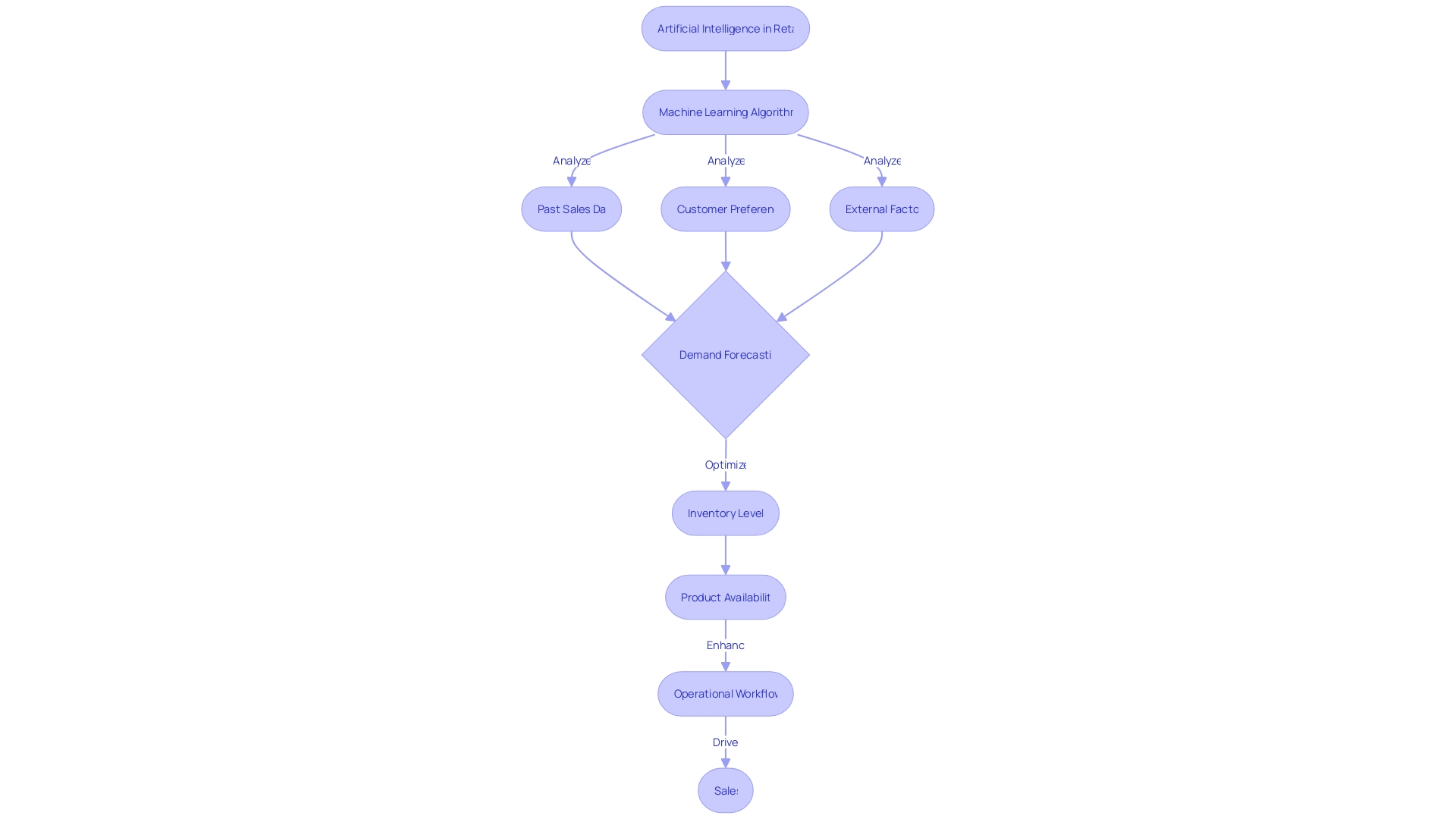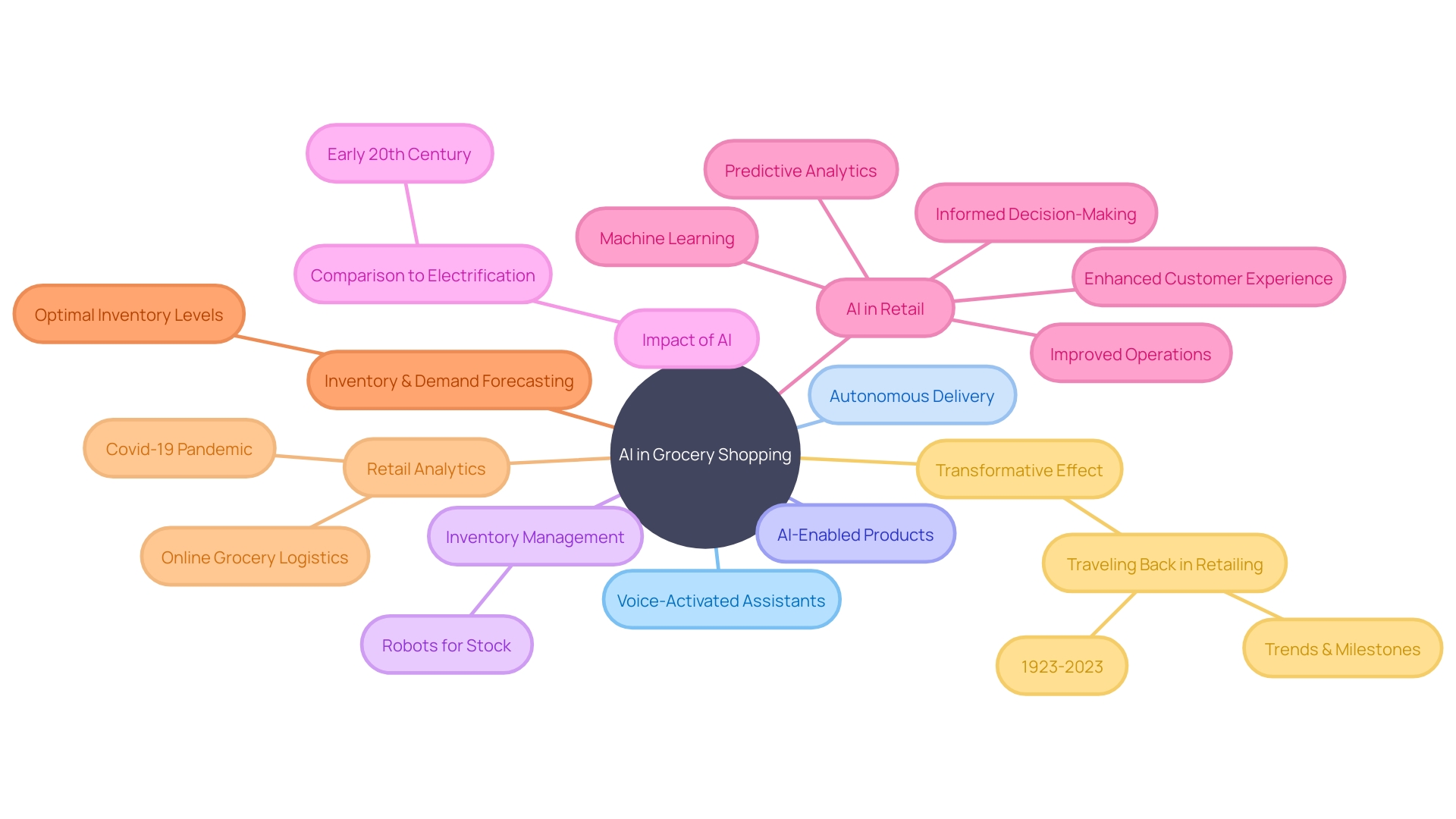Introduction
Artificial Intelligence (AI) is revolutionizing the retail industry, particularly in the realm of grocery stores. With AI-enabled technologies like visual search, improved inventory management, personalization and recommendation systems, supply chain optimization, real-life case studies, and future innovations, AI is transforming the way customers shop and how retailers operate.
This article explores the various ways AI is reshaping the retail landscape, providing insights into its impact on customer experiences, inventory management, demand forecasting, and sustainability efforts. By leveraging AI-powered solutions, retailers can enhance efficiency, customer satisfaction, and profitability in the modern retail era.
AI-Enhanced Visual Search
Artificial Intelligence (AI) is transforming the retail landscape with innovations like AI-enabled visual search, which is enhancing the way customers locate products within grocery stores. By integrating a combination of sensors, algorithms, and connectivity components, as highlighted by the University of Surrey's Sabine Benoit, AI-enabled products are streamlining the cognitive efforts involved in shopping. Customers can now effortlessly capture or upload an image of the desired product, and the technology will navigate them to its location, mirroring the convenience of services like Google Maps in outdoor navigation.
This capability not only improves the customer experience but also addresses the challenge of accurately determining a product's share on store shelves. AI algorithms can analyze a sequence of images to count products and avoid duplication, which is essential for managing a product's presence effectively. As the retail sector continues to embrace AI for inventory management and demand forecasting, machine learning algorithms are proving their worth by analyzing sales data to predict future demand, thus minimizing overstocking or stock-outs.
This proactive approach to inventory management ensures retailers maintain optimal stock levels. Moreover, the COVID-19 pandemic has underscored the importance of AI in retail, as outlined in the paper 'Retail Analytics in the New Normal.' Retailers are now more than ever aware of the power of data analytics and AI to navigate disruptions and leverage online-offline synergies, making AI an indispensable tool in the modern retail era.
Improved Inventory Management
Artificial Intelligence (AI) is reshaping the retail landscape, bringing a seismic shift in how grocery stores manage their inventory. Utilizing machine learning algorithms, AI delves into the vast sea of data, encompassing sales history, customer preferences, and various external factors.
Such in-depth analysis enables AI to forecast demand with remarkable precision, streamlining inventory levels to meet consumer needs while minimizing waste. The result is a retail environment where products are available when and where customers need them, enhancing satisfaction and driving sales.
This technological evolution echoes the transformative impact of historical advancements like electrification, which revolutionized industries over time. In the contemporary retail ecosystem, Ai's influence extends beyond efficiency; it's about constructing a seamless bridge between data analytics and practical, tangible improvements in operational workflows. As AI continues to evolve, its role in optimizing retail operations and elevating customer experiences becomes increasingly pivotal, mirroring the revolutionary promise of innovations past.

Personalization and Recommendation
The retail industry is witnessing a transformative era where artificial intelligence (AI) plays a pivotal role in enhancing customer experiences. At the forefront, grocery stores are utilizing AI-powered recommendation systems to offer a personalized shopping journey.
By analyzing a customer's shopping behavior and purchase history, these systems deliver tailor-made offers, discounts, and product suggestions. Such personalized engagement not only elevates customer satisfaction but also significantly drives sales.
Moreover, Ai's application extends beyond customer interaction to operations like inventory management and demand forecasting. Leveraging machine learning algorithms, retailers can now predict future demand with high precision, reducing the risk of stock shortages or excess, and maintaining an optimal inventory level.
This level of efficiency is crucial, especially in light of the EU's challenge with food waste, where retailers are urged to minimize their contribution. AI technologies, including predictive analytics, are instrumental in achieving this by ensuring the right products are available at the right time, thus reducing waste and enhancing sustainability. As the retail landscape evolves, particularly after the disruptions caused by the COVID-19 pandemic, Ai's role in adapting to new normals—such as a surge in online grocery orders—is undeniable. Retailers are now recognizing the power of AI in facilitating logistics, managing unexpected shifts in buying patterns, and harmonizing online and offline retail experiences. These advancements in AI retail analytics not only address current challenges but also pave the way for future innovations that could redefine the shopping experience altogether.
Supply Chain Optimization
In the realm of grocery retail, Artificial Intelligence (AI) is revolutionizing the supply chain, forging a new path to operational excellence. By harnessing the power of AI, retailers are transforming the way they manage inventory and forecast demand.
Machine learning algorithms delve into vast amounts of past sales data and other relevant factors, providing astute predictions of future demand. This level of precision in demand forecasting is pivotal, as it significantly diminishes the risks of stock-outs or excess inventory, maintaining an ideal stock level consistently.
Furthermore, AI's role extends to refining logistics. It not only identifies areas of inefficiency within the supply chain but also optimizes delivery routes, contributing to a reduction in transportation costs.
The ripple effect of these advancements is a more synchronized supply chain, marked by timely deliveries to stores and a robust response to the dynamic retail landscape. According to recent insights, the European Union grapples with approximately 60 million tonnes of food waste annually, reflecting a market value surpassing €1 billion. While a considerable portion of this waste originates from households, retailers are under increasing pressure from the European Commission to mitigate their share of the waste. Ai's strategic deployment in inventory management and optimized logistics stands as a crucial step towards achieving this goal, offering a beacon of hope in the effort to curb food waste within the sector.
Real-life Case Studies
In the dynamic world of retail, AI has become a game-changer, especially in inventory management and demand forecasting. For instance, an innovative startup has harnessed a fleet of robots, utilizing sensor technologies and AI, to revolutionize inventory management.
These robots meticulously track inventory levels and product expiration dates, employing machine learning and computer vision to ensure quality control. This automation not only optimizes stock levels but also enhances customer experiences by preventing stock-outs and overstocking.
Similarly, Wayfair, with its mission to connect customers to their desired products, leverages AI to sift through its vast catalog of over 40 million items from more than 20,000 suppliers. By analyzing product attributes like color and shape, Wayfair's machine learning algorithms provide customers with highly targeted search results, streamlining the shopping experience. The platform's use of product tags to categorize and store descriptive information exemplifies the power of AI in transforming the retail landscape, leading to increased satisfaction and profitability.
Future Innovations
Artificial intelligence is transforming the grocery shopping experience with innovations that extend far beyond the checkout line. For instance, imagine the convenience of voice-activated shopping assistants guiding you through the aisles, or the efficiency of autonomous delivery vehicles ensuring your groceries arrive at your doorstep. These technologies, rooted in AI, are not mere conveniences but are shaping a new era of retail.
AI-enabled products, as defined by Sabine Benoit of the University of Surrey, combine sensors, algorithms, and connectivity to significantly reduce the cognitive load on customers and staff alike, streamlining decision-making and operational processes. This integration of AI is particularly evident in startups that utilize fleets of robots to manage inventory with unparalleled precision, tracking stock levels and expiration dates through advanced sensor technology and machine learning. The impact of AI in retail mirrors the transformative effect of electrification in the early 20th century—a slow but inevitable revolution that fundamentally reshapes industry practices and consumer expectations.

Conclusion
In conclusion, AI is revolutionizing the retail industry, particularly in grocery stores. AI-enabled technologies like visual search, improved inventory management, personalization and recommendation systems, supply chain optimization, and future innovations are transforming the way customers shop and how retailers operate.
AI-powered visual search streamlines the customer experience by locating products within stores effortlessly. Improved inventory management through machine learning algorithms ensures optimal stock levels and minimizes overstocking or stock-outs.
Personalization and recommendation systems offer tailor-made offers and suggestions based on customer behavior, driving sales and satisfaction. AI's application extends to operations like inventory management and demand forecasting, reducing waste and enhancing sustainability efforts.
Supply chain optimization powered by AI provides precise demand forecasting and optimized delivery routes, resulting in a synchronized supply chain with reduced transportation costs. Real-life case studies highlight the transformative impact of AI on inventory management.
Companies utilize robots equipped with sensor technologies and AI to optimize stock levels and prevent stock-outs, enhancing customer experiences. Future innovations in AI will continue shaping the grocery shopping experience. Voice-activated shopping assistants and autonomous delivery vehicles streamline decision-making processes and operational workflows. By leveraging AI-powered solutions, retailers enhance efficiency, customer satisfaction, and profitability in the modern retail era. Embracing AI is essential for staying competitive in a rapidly evolving industry landscape.





